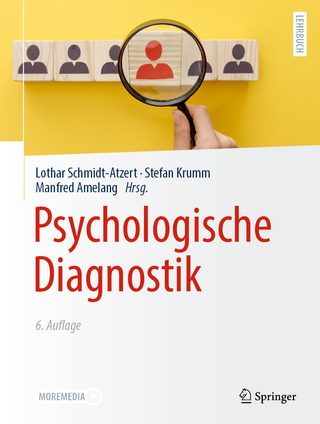
Forensic Psychology
Psychology Press (Verlag)
978-0-205-20927-9 (ISBN)
- Titel ist leider vergriffen;
keine Neuauflage - Artikel merken
Forensic Psychology takes a broad-based perspective, incorporating both experimental and clinical topics. This text includes current developments by theorists and researchers in the field. By focusing on multidisciplinary theories, readers gain an understanding of different forensic psychology areas, showing interplay among cognitive, biological, and social factors. Readers will find that the ideas, issues, and research in this text are presented in a style that they will understand, enjoy, and find useful in their professional careers.
Learning Goals
Upon completing this book, readers should be able to:
Apply Forensic Psychology in everyday life
Apply research to the Forensic Psychology field
Make connections between various psychology courses and topics
Note: MySearchLab does not come automatically packaged with this text. To purchase MySearchLab, please visit www.mysearchlab.com or you can purchase a ValuePack of the text + MySearchLab: ValuePack ISBN-10: TBD / ValuePack ISBN-13: TBD
Dr. Joanna Pozzulo is a Professor in the Department of Psychology at Carleton University in Canada. Dr. Pozzulo’s research and teaching falls under the domain of Forensic Psychology (borrowing from developmental, social, and cognitive psychology). Dr. Pozzulo is focused on understanding the development of face memory and the procedures that police can use to increase the reliability of face identification from lineups wth an emphasis on children's identification evidence. Dr. Pozzulo also is a child clinical psychologist registered with the Ontario College of Psychologists. Dr. Adelle Forth is an Associate Professor in the Department of Psychology at Carleton University in Canada where she also serves as Director of the Psychopathy Research Lab. She conducts research on the validity of the construct of psychopathy in different populations, the emotional and cognitive processes that underlie psychopathy, evaluating the impact psychopath's have on victims, and violence risk assessment. Dr. Forth is currently on the board of directors for the Society for the Scientific Study of Psychopathy. She teaches forensic psychology classes both at the undergraduate and graduate level.
In this Section:
1) Brief Table of Contents
2) Full Table of Contents
BRIEF TABLE OF CONTENTS:
Chapter 1: Introduction to Forensic Psychology
Chapter 2: Police Psychology
Chapter 3: The Psychology of Police Investigations
Chapter 4: Deception
Chapter 5: Eyewitness Testimony
Chapter 6: Child victims and witnesses
Chapter 7: Juries: Fact Finder
Chapter 8: The Role of Mental Illness in Court
Chapter 9: Sentencing in the U.S.: Practice and Public Opinion
Chapter 10: Psychopaths
Chapter 11: Risk Assessment
Chapter 12: Assessment and Treatment of Juvenile Delinquency
Chapter 13: Domestic Violence
Chapter 14: Sexual and Homicidal Offenders
FULL TABLE OF CONTENTS:
Chapter 1: Introduction To Forensic Psychology
What Is Forensic Psychology?
The Roles Of A Forensic Psychologist
The Relationship Between Psychology And Law
The History Of Forensic Psychology
Modern-Day Debates: Psychological Experts In Court
Chapter 2: Police Psychology
Police Selection
Police Discretion
Police Stress
Chapter 3: The Psychology Of Police Investigations
Police Interrogations
False Confessions
Criminal Profiling
Geographic Profiling
Chapter 4: Deception
The Polygraph Technique
Brain-Based Deception Research
Assessment Of Malingering And Deception
Assessment Methods To Detect Malingered Psychosis
Chapter 5: Eyewitness Testimony
Eyewitness Testimony: The Role Of Memory
How Do We Study Eyewitness Issues?
Recall Memory
Procedures That Help Police Interview Eyewitnesses
Recall Of The Culprit
Recognition Memory
Expert Testimony On Eyewitness Issues
Public Policy Issues And Guidelines
Chapter 6: Child Victims And Witnesses
History
Recall For Events
Recall Memory Following A Long Delay
Recall For People
Recognition
Testifying In Court
Risk Factors Associated With Child Maltreatment
Short-Term And Long-Term Effects Of Sexual Abuse
Chapter 7: Juries: Fact Finder
Getting To Trial
Jury Selection
Characteristics And Responsibilities Of Juries
Jury Functions
How Do We Study Jury Behavior?
Field Studies
Reaching A Verdict
Jury Decision-Making Models
Predicting Verdicts
Chapter 8: The Role Of Mental Illness In Court
Diagnosing Mental Disorders
Presumptions In The Criminal Justice System
Competency To Stand Trial
Mental State At Time Of Offense
Defendants With Mental Disorders
A New Court For People With Mental Illness: The Mental Health Courts
Chapter 9: Sentencing In The U.S.: Practice And Public Opinion
The Structure Of The U.S. Court System
Sentencing In The United States
Public Attitudes Toward Sentencing
Chapter 10: Psychopaths
What Is Risk Assessment?
Risk Assessments: When Are They Conducted?
Types Of Prediction Outcomes
Methodological Issues
Judgment Error And Biases
Important Risk Factors
Current Issues
Chapter 11: Risk Assessment
Assessment Of Psychopathy
Psychopathy And Antisocial Personality Disorder
What Makes Them Tick?: Cognitive And Affective Models Of Psychopathy
Psychopathy And Violence
Psychopaths In The Community
Psychopathy And Sexual Violence
Psychopathy In Youth
Psychopathy: Nature Vs Nurture?
Psychopathy And Treatment
Forensic Use Of Psychopathy
Chapter 12: Assessment And Treatment Of Juvenile Delinquency
Young Offenders
Historical Overview
Youth Crime Rates
Assessment Of Young Offenders
Trajectories Of Young Offenders
Theories To Explain Antisocial Behavior
Risk Factors
Prevention, Intervention, And Treatment Of Young Offending
Chapter 13: Domestic Violence
Types Of Violence And Measurement
Theories Of Intimate Partner Violence
Why Do Battered Women Stay?
A Heterogeneous Population: Typologies Of Male Batterers
Criminal Justice Response
Stalking: Definition, Prevalence, And Typologies
Chapter 14: Sexual And Homicidal Offenders
Sexual Offenders
Effectiveness Of Treatment For Sexual Offenders
Homicidal Offenders
Bimodal Classification Of Homicide
Filicide: When Parents Kill
| Erscheint lt. Verlag | 8.2.2013 |
|---|---|
| Verlagsort | Philadelphia |
| Sprache | englisch |
| Maße | 187 x 232 mm |
| Gewicht | 744 g |
| Themenwelt | Schulbuch / Wörterbuch |
| Geisteswissenschaften ► Psychologie | |
| ISBN-10 | 0-205-20927-0 / 0205209270 |
| ISBN-13 | 978-0-205-20927-9 / 9780205209279 |
| Zustand | Neuware |
| Haben Sie eine Frage zum Produkt? |
aus dem Bereich


